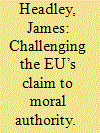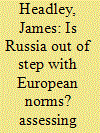|
|
|
Sort Order |
|
|
|
Items / Page
|
|
|
|
|
|
|
| Srl | Item |
| 1 |
ID:
144988


|
|
|
|
|
| Summary/Abstract |
Normative Power Europe is not just an academic concept: it is part of the self-understanding of many EU policymakers. They believe that the EU is setting standards of state behaviour in Europe and globally. The EU is regarded as an elaborator and epitomizer of European and ‘civilised’ values, as a model for other regions and states and as inherently an ethical actor. Russian policymakers reject these notions and, in doing so, increasingly accuse the EU of ‘double standards’, arguing that EU external action is inconsistent and does not always match its rhetoric; that the rhetoric therefore masks the pursuit of interests in its foreign policy; that the EU is like any other state (or state-like entity) and has no special claim to act ethically or to be a moral authority; and that internally, the EU does not live up to the values it seeks to impose on others. This article gives examples of Russian talk of EU double standards, analyses the motivations and assesses the likely impact. It argues that for such criticism to have any impact on EU policy, the critic must be seen as a moral equal, which the EU’s sense of moral superiority over Russia rules out.
|
|
|
|
|
|
|
|
|
|
|
|
|
|
|
|
| 2 |
ID:
109964


|
|
|
|
|
| Publication |
2012.
|
| Summary/Abstract |
This article1
investigates public opinion on New Zealand's foreign policy, drawing on the findings of a comprehensive poll of general public and elite opinion conducted in 2008. It analyses what New Zealanders think about a range of foreign policy issues and whether public opinion matches actual foreign policy. It argues that the majority of the public support the broad parameters of official policy, but that there are significant differences of opinion in some specific areas, particularly trade agreements and defence. These differences correspond in particular to political orientation and age, gender and income level. The article also outlines the key differences between public opinion and the opinion of the positional elite. Overall, it is argued that the New Zealand public does have clear opinions on foreign policy issues and that these are generally consistent. The article proposes more frequent polling and more public debate over foreign policy.
|
|
|
|
|
|
|
|
|
|
|
|
|
|
|
|
| 3 |
ID:
112152


|
|
|
|
|
| Publication |
2012.
|
| Summary/Abstract |
This article examines the question of European identity in Russian foreign policy through the notion of European norms. By considering attitudes towards the death penalty, it identifies different strands of thought in the Russian elite, and argues that an assertive Europeanism is now dominant as Russia seeks to be an equal participant in the development of common norms. However, there is a tendency for Russia's 'Europeanness' to be questioned because of behaviour that is considered out of step with European Union standards. I argue that even in an area of significant controversy between Russia and other European states, self-determination for national minorities, there is potential for the delineation of common principles, but only as an inclusive process on the basis of consensus.
|
|
|
|
|
|
|
|
|
|
|
|
|
|
|
|
| 4 |
ID:
112797


|
|
|
|
|
| Publication |
2012.
|
| Summary/Abstract |
It is 20 years since the violent disintegration of Yugoslavia and the more peaceful, but still problematic, break-up of the Soviet Union. The on-going question of the status of Kosovo, continuing international involvement in Bosnia, the dormant conflicts in Transdniestria and Nagorno-Karabakh, recurrent violence in the North Caucasus, and the 2008 war between Russia and Georgia show that issues surrounding the break-up of both states remain pertinent today. This paper considers, firstly, whether norms surrounding self-determination and secession have been developed in response to events in former Yugoslavia and the former Soviet Union. Secondly, it examines what ideas of the nation have emerged: for example, does the civic/ethnic distinction apply or is it too simplistic or value-laden, and what norms if any of citizenship are developing? Thirdly, the paper considers whether regional integration is helping to overcome tensions around national boundaries and membership, or whether it is instead creating competition between outside actors (particularly the EU and Russia) to gain influence over the countries 'in between', at the same time as exacerbating internal tensions in countries such as Ukraine and Serbia over their foreign policy orientation.
|
|
|
|
|
|
|
|
|
|
|
|
|
|
|
|
|
|
|
|
|